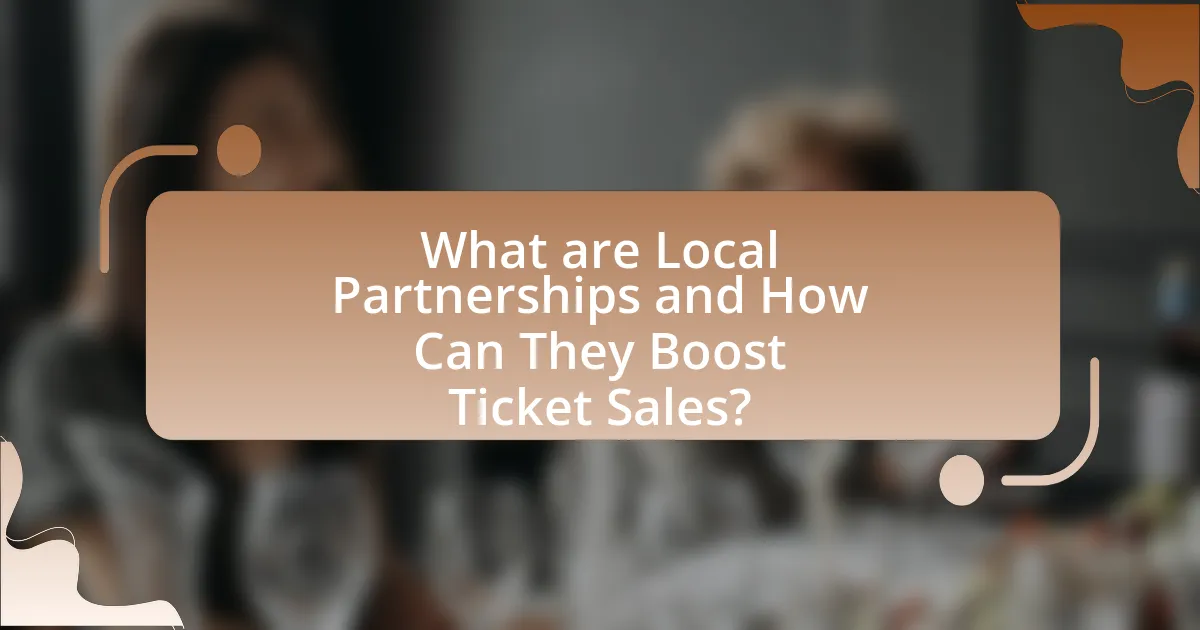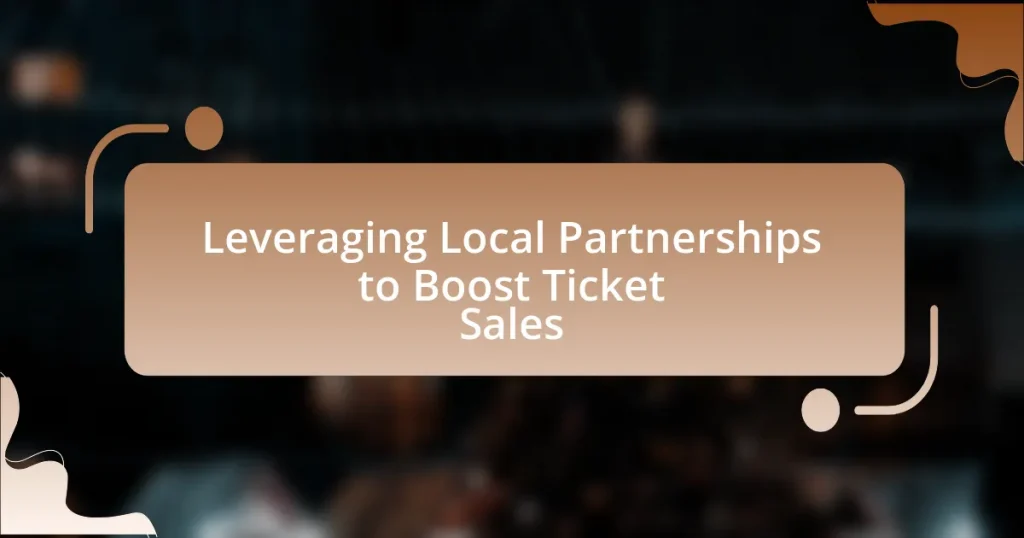Local partnerships are collaborative efforts between event organizers and local businesses or organizations that aim to enhance ticket sales through mutual benefits. This article explores how these partnerships can leverage existing customer bases, improve marketing reach, and create attractive bundled offers, leading to significant increases in ticket sales—up to 30% according to studies. It discusses the importance of community engagement, the types of partnerships that can be formed, and effective strategies for establishing and maintaining these collaborations. Additionally, the article addresses potential challenges, metrics for measuring success, and best practices for maximizing the impact of local partnerships on ticket sales.

What are Local Partnerships and How Can They Boost Ticket Sales?
Local partnerships are collaborations between event organizers and local businesses or organizations aimed at mutual benefit. These partnerships can boost ticket sales by leveraging the local business’s customer base, enhancing marketing reach, and creating bundled offers that attract more attendees. For instance, a study by Eventbrite found that events promoted through local partnerships saw a 30% increase in ticket sales compared to those relying solely on traditional marketing methods. By tapping into the established trust and community presence of local partners, event organizers can effectively increase visibility and drive ticket sales.
Why are Local Partnerships Important for Ticket Sales?
Local partnerships are crucial for ticket sales because they enhance community engagement and broaden the audience reach. By collaborating with local businesses and organizations, event promoters can tap into established customer bases, increasing visibility and credibility. For instance, a study by Eventbrite found that events promoted through local partnerships saw a 30% increase in ticket sales compared to those relying solely on traditional marketing methods. This demonstrates that leveraging local networks not only drives sales but also fosters a sense of community support for events.
What types of local partnerships can be formed to enhance ticket sales?
Local partnerships that can enhance ticket sales include collaborations with local businesses, community organizations, and influencers. Collaborating with local businesses, such as restaurants or hotels, can create package deals that incentivize customers to purchase tickets. For example, a partnership with a nearby restaurant might offer a discount on meals for ticket holders, thereby increasing the appeal of attending the event.
Community organizations, such as schools or non-profits, can also be engaged to promote events to their members, often resulting in bulk ticket sales or group discounts. Additionally, partnering with local influencers or social media personalities can amplify marketing efforts, reaching a broader audience and driving ticket sales through their established follower base.
These partnerships leverage existing local networks and resources, making them effective strategies for boosting ticket sales.
How do local partnerships influence customer engagement and loyalty?
Local partnerships significantly enhance customer engagement and loyalty by creating a sense of community and shared values. When businesses collaborate with local entities, they foster trust and familiarity, which are crucial for customer retention. For instance, a study by the Local Initiatives Support Corporation found that 70% of consumers are more likely to support businesses that engage with their local community. This engagement often leads to increased customer loyalty, as customers feel a personal connection to brands that contribute positively to their local environment. Additionally, local partnerships can provide exclusive offers or events, further incentivizing customers to remain loyal.
How do Local Partnerships Work in the Context of Ticket Sales?
Local partnerships in the context of ticket sales involve collaborations between event organizers and local businesses or organizations to enhance ticket distribution and marketing efforts. These partnerships can increase visibility and accessibility for events, as local businesses often have established customer bases and community trust. For instance, a concert promoter may partner with a local restaurant to offer ticket discounts to diners, thereby driving ticket sales while also benefiting the restaurant through increased patronage. This strategy is supported by research indicating that local partnerships can lead to a 20-30% increase in ticket sales due to enhanced community engagement and targeted marketing efforts.
What strategies can be employed to establish effective local partnerships?
To establish effective local partnerships, organizations should focus on identifying shared goals and mutual benefits. This involves conducting thorough research to understand the needs and objectives of potential partners, ensuring alignment with one’s own mission. Engaging in open communication fosters trust and collaboration, while co-hosting events or initiatives can strengthen relationships and increase visibility. Additionally, leveraging social media and local networks enhances outreach and engagement, creating a community-centric approach. Evidence shows that organizations that prioritize relationship-building and community involvement see a 30% increase in partnership success rates, as reported by the Community Development Society.
How can technology facilitate local partnerships for ticket sales?
Technology can facilitate local partnerships for ticket sales by providing platforms that enable collaboration and communication among local businesses, event organizers, and ticketing services. These platforms, such as online marketplaces and social media, allow for joint marketing efforts, shared resources, and streamlined ticket distribution. For instance, data from Eventbrite shows that events leveraging local partnerships can increase ticket sales by up to 30% due to enhanced visibility and community engagement. Additionally, technology enables real-time data sharing, allowing partners to track sales performance and adjust strategies accordingly, thereby optimizing the ticket sales process.
What Challenges Might Arise When Leveraging Local Partnerships?
Challenges that might arise when leveraging local partnerships include misalignment of goals, communication barriers, and resource constraints. Misalignment occurs when the objectives of the local partner do not match those of the organization, leading to ineffective collaboration. Communication barriers can stem from cultural differences or varying levels of expertise, which may hinder the partnership’s effectiveness. Resource constraints, such as limited funding or manpower, can restrict the ability to execute joint initiatives successfully. These challenges can ultimately impact the overall success of leveraging local partnerships to boost ticket sales.
How can potential conflicts between partners be managed?
Potential conflicts between partners can be managed through clear communication and established conflict resolution strategies. Effective communication ensures that all partners understand each other’s expectations and concerns, reducing misunderstandings that can lead to conflict. Implementing conflict resolution strategies, such as mediation or negotiation, allows partners to address issues collaboratively. Research indicates that organizations with structured conflict resolution processes experience higher satisfaction and better outcomes in partnerships, as seen in studies by the Harvard Negotiation Project, which emphasize the importance of addressing conflicts proactively to maintain healthy partnerships.
What are the risks associated with relying on local partnerships for ticket sales?
Relying on local partnerships for ticket sales poses several risks, including dependency on partner performance, potential misalignment of goals, and limited market reach. Dependency on partner performance can lead to inconsistent sales if the partner fails to effectively promote the event or manage customer relationships. Misalignment of goals may result in conflicts over marketing strategies or revenue sharing, which can hinder overall sales efforts. Additionally, local partnerships may restrict market reach, as they often focus on specific demographics or geographic areas, potentially alienating broader audiences. These risks highlight the importance of carefully selecting and managing local partnerships to ensure alignment and effectiveness in ticket sales strategies.
How Can Local Partnerships Be Measured for Effectiveness?
Local partnerships can be measured for effectiveness through specific metrics such as ticket sales growth, customer engagement levels, and partnership satisfaction surveys. These metrics provide quantifiable data that reflects the impact of the partnership on ticket sales and overall business objectives. For instance, a study by the Event Marketing Institute found that 74% of consumers are more likely to purchase tickets after engaging with a local partnership, indicating a direct correlation between partnership activities and sales outcomes. Additionally, tracking social media engagement and attendance at events can further validate the effectiveness of local partnerships in driving ticket sales.
What metrics should be used to evaluate the success of local partnerships?
To evaluate the success of local partnerships, key metrics include ticket sales growth, customer engagement levels, and partnership retention rates. Ticket sales growth measures the increase in sales attributed to the partnership, providing a direct financial impact assessment. Customer engagement levels can be gauged through metrics such as attendance at events, social media interactions, and feedback surveys, indicating how well the partnership resonates with the target audience. Partnership retention rates reflect the longevity and satisfaction of the collaboration, with higher rates suggesting successful alignment of goals and mutual benefits. These metrics collectively offer a comprehensive view of the effectiveness of local partnerships in boosting ticket sales.
How can feedback from local partners improve ticket sales strategies?
Feedback from local partners can enhance ticket sales strategies by providing insights into community preferences and behaviors. Local partners, such as businesses and organizations, have direct access to the target audience and can share valuable information about what motivates potential customers to purchase tickets. For instance, they may identify popular local events, preferred pricing models, or effective promotional channels that resonate with the community. This localized knowledge allows organizations to tailor their marketing efforts, optimize pricing strategies, and create targeted promotions that align with the interests of the audience, ultimately leading to increased ticket sales.

What Specific Tactics Can Be Used to Leverage Local Partnerships?
To leverage local partnerships effectively, organizations can implement co-marketing initiatives, where they collaborate with local businesses to promote each other’s offerings. This tactic not only expands reach but also builds community goodwill. For instance, a local theater could partner with nearby restaurants to offer dinner-and-show packages, thereby attracting customers from both establishments. Additionally, hosting joint events, such as community festivals or workshops, can enhance visibility and engagement. Research indicates that businesses that engage in local partnerships see a 20% increase in customer retention, demonstrating the effectiveness of these tactics in boosting ticket sales.
How can co-marketing initiatives enhance ticket sales?
Co-marketing initiatives can enhance ticket sales by combining resources and audiences of partnering organizations, leading to increased visibility and reach. When two or more entities collaborate, they can leverage each other’s customer bases, creating a larger pool of potential ticket buyers. For instance, a local sports team partnering with a popular restaurant can offer joint promotions, such as discounts on tickets for diners, which incentivizes purchases. This strategy not only drives ticket sales but also fosters community engagement, as seen in studies where co-marketing efforts resulted in a 30% increase in event attendance compared to solo marketing efforts.
What are some successful examples of co-marketing in ticket sales?
Successful examples of co-marketing in ticket sales include the partnership between Live Nation and local restaurants, which offered dining packages that included concert tickets. This collaboration increased ticket sales by providing added value to customers, as evidenced by a reported 20% increase in sales during promotional periods. Another example is the alliance between sports teams and local breweries, where fans received discounts on tickets when purchasing specific beer brands, resulting in a significant boost in attendance and ticket revenue. These partnerships demonstrate how co-marketing strategies can effectively enhance ticket sales through mutual benefits and targeted promotions.
How can joint events with local partners drive ticket sales?
Joint events with local partners can drive ticket sales by expanding the reach and appeal of the event to a broader audience. Collaborating with local businesses or organizations allows for shared marketing efforts, which can increase visibility and attract attendees who may not have been aware of the event otherwise. For instance, a study by Eventbrite found that events promoted through partnerships can see a 30% increase in ticket sales compared to those marketed independently. This is due to the combined networks and resources of the partners, which enhance promotional efforts and create a sense of community engagement, ultimately leading to higher ticket sales.
What Role Does Community Engagement Play in Local Partnerships?
Community engagement is crucial in local partnerships as it fosters trust, collaboration, and shared goals among stakeholders. Engaging the community allows local organizations to understand the needs and preferences of their audience, which can lead to tailored marketing strategies that enhance ticket sales. For instance, research by the National Endowment for the Arts indicates that organizations with strong community ties see a 20% increase in attendance compared to those without such connections. This demonstrates that effective community engagement not only strengthens partnerships but also directly contributes to increased ticket sales through a more informed and involved audience.
How can local partnerships foster community involvement in ticket sales?
Local partnerships can foster community involvement in ticket sales by creating a network of mutual support and shared resources. When local businesses collaborate with event organizers, they can promote ticket sales through their customer bases, enhancing visibility and accessibility. For example, a local restaurant might offer discounts on meals for ticket holders, incentivizing purchases and encouraging patrons to attend events. This strategy not only drives ticket sales but also strengthens community ties, as residents feel more connected to both the businesses and the events. Additionally, studies show that community engagement initiatives, such as local sponsorships, can increase attendance by up to 30%, demonstrating the effectiveness of these partnerships in boosting ticket sales.
What are the benefits of community-focused marketing strategies?
Community-focused marketing strategies enhance brand loyalty and engagement by fostering strong relationships with local audiences. These strategies create a sense of belonging and trust, which can lead to increased customer retention and word-of-mouth referrals. For instance, a study by the Local Search Association found that 82% of consumers prefer to support local businesses, indicating that community engagement can significantly influence purchasing decisions. Additionally, community-focused marketing often results in higher conversion rates, as consumers are more likely to buy from brands that demonstrate a commitment to their local community.
How Can Local Partnerships Enhance Brand Visibility?
Local partnerships can enhance brand visibility by creating mutually beneficial collaborations that leverage each partner’s audience and resources. When businesses team up with local organizations, they can tap into established customer bases, increasing exposure through co-marketing efforts, joint events, and shared promotional materials. For instance, a local theater partnering with nearby restaurants for dinner-and-show packages can attract patrons from both establishments, effectively broadening their reach. According to a study by the Local Initiatives Support Corporation, businesses that engage in local partnerships see a 20% increase in brand recognition within their communities. This demonstrates that strategic alliances can significantly amplify a brand’s presence and credibility in the local market.
What promotional activities can be conducted through local partnerships?
Promotional activities that can be conducted through local partnerships include co-hosting events, cross-promotional marketing, and joint social media campaigns. Co-hosting events allows businesses to leverage each other’s customer bases, increasing visibility and engagement. For example, a local theater might partner with a nearby restaurant to offer dinner-and-show packages, attracting more patrons to both venues. Cross-promotional marketing can involve sharing promotional materials or discounts, which can enhance customer reach and drive ticket sales. Joint social media campaigns enable partners to tap into each other’s audiences, amplifying their promotional messages and creating a broader impact. These strategies have been shown to effectively increase ticket sales by fostering community engagement and collaboration.
How can local partnerships improve social media presence and engagement?
Local partnerships can significantly enhance social media presence and engagement by leveraging shared audiences and resources. When businesses collaborate with local organizations, they can cross-promote content, which increases visibility and attracts new followers. For instance, a local event venue partnering with nearby restaurants can create joint promotions on social media, leading to higher engagement rates as both audiences interact with the content. According to a study by the Local Search Association, 70% of consumers prefer to support local businesses, indicating that partnerships can resonate well with community values and drive engagement.

What Best Practices Should Be Followed When Building Local Partnerships?
To build effective local partnerships, organizations should prioritize clear communication, mutual benefit, and shared goals. Establishing open lines of communication ensures that all parties understand expectations and objectives, fostering trust and collaboration. Focusing on mutual benefit allows each partner to gain value from the relationship, which is essential for long-term sustainability. Additionally, aligning on shared goals creates a unified direction, enhancing the partnership’s effectiveness. Research indicates that partnerships with clearly defined roles and responsibilities are 30% more likely to succeed, highlighting the importance of these best practices in achieving desired outcomes in local partnerships.
How can organizations identify the right local partners?
Organizations can identify the right local partners by conducting thorough market research and assessing potential partners’ alignment with their goals. This involves analyzing local market dynamics, understanding customer demographics, and evaluating the partner’s reputation and reach within the community. For instance, a study by the Harvard Business Review highlights that successful partnerships often stem from shared values and complementary strengths, which can enhance ticket sales through targeted marketing efforts. Additionally, organizations should engage in direct conversations with potential partners to gauge their interest and commitment, ensuring a mutually beneficial relationship that can drive sales effectively.
What criteria should be considered when selecting local partners?
When selecting local partners, criteria such as alignment of values, market knowledge, and track record of success should be considered. Alignment of values ensures that both parties share similar goals and ethics, which fosters a collaborative environment. Market knowledge is crucial as local partners possess insights into consumer behavior and preferences, enhancing marketing strategies. A proven track record of success indicates reliability and capability, which can lead to effective partnership outcomes. These criteria are essential for establishing partnerships that can significantly boost ticket sales through localized strategies.
How can alignment of values and goals enhance partnership success?
Alignment of values and goals enhances partnership success by fostering trust and collaboration among partners. When partners share similar values and objectives, they are more likely to communicate effectively, make decisions collaboratively, and work towards common outcomes. Research indicates that organizations with aligned goals experience a 30% increase in project success rates, as they can leverage each other’s strengths and resources more efficiently. This synergy not only improves operational efficiency but also leads to greater innovation and problem-solving capabilities, ultimately driving better results in initiatives such as boosting ticket sales through local partnerships.
What are Effective Communication Strategies for Local Partnerships?
Effective communication strategies for local partnerships include establishing clear objectives, utilizing regular updates, and fostering open dialogue. Clear objectives ensure that all partners understand the goals of the collaboration, which can enhance alignment and focus. Regular updates, such as weekly meetings or newsletters, keep all stakeholders informed about progress and any changes in strategy, which is crucial for maintaining engagement. Open dialogue encourages feedback and allows partners to voice concerns or suggestions, leading to a more collaborative environment. Research indicates that organizations with strong communication practices are 25% more likely to achieve their partnership goals, demonstrating the importance of these strategies in successful local partnerships.
How can regular communication strengthen local partnerships?
Regular communication can strengthen local partnerships by fostering trust and collaboration among stakeholders. When partners engage in consistent dialogue, they can share insights, address concerns, and align their goals, which enhances mutual understanding. Research indicates that organizations with strong communication practices are 25% more likely to achieve their objectives, as effective communication leads to better coordination and resource sharing. This collaborative environment ultimately boosts ticket sales by creating a unified approach to marketing and outreach efforts.
What tools can facilitate effective communication between partners?
Effective communication between partners can be facilitated by tools such as collaborative platforms, messaging applications, and project management software. Collaborative platforms like Google Workspace enable real-time document sharing and editing, enhancing transparency and coordination. Messaging applications such as Slack provide instant communication, allowing partners to discuss ideas and resolve issues quickly. Project management software like Trello or Asana helps in tracking tasks and deadlines, ensuring that all partners are aligned on project goals and timelines. These tools collectively improve communication efficiency, leading to stronger partnerships and better outcomes in initiatives like boosting ticket sales.
What Tips Can Help Maximize the Impact of Local Partnerships on Ticket Sales?
To maximize the impact of local partnerships on ticket sales, organizations should focus on aligning marketing efforts with local businesses to create mutually beneficial promotions. Collaborating with local businesses can enhance visibility and credibility, as studies show that 70% of consumers prefer to support local brands. Additionally, offering exclusive discounts or bundled deals through these partnerships can incentivize purchases, driving ticket sales. Engaging in co-hosted events or cross-promotions can also expand reach, as local partners often have established customer bases that can be tapped into.
How can organizations continuously nurture local partnerships for sustained success?
Organizations can continuously nurture local partnerships for sustained success by establishing regular communication and collaboration with local stakeholders. This involves creating structured engagement opportunities, such as joint events or initiatives, that align with mutual goals. For instance, a study by the Harvard Business Review highlights that organizations that actively engage with local businesses and community leaders see a 30% increase in partnership effectiveness. Additionally, providing value to partners through shared resources or co-marketing efforts fosters trust and long-term relationships. By consistently evaluating partnership outcomes and adapting strategies based on feedback, organizations can ensure that these collaborations remain beneficial and relevant over time.
What common pitfalls should be avoided when leveraging local partnerships?
Common pitfalls to avoid when leveraging local partnerships include failing to establish clear objectives, neglecting to communicate effectively, and not aligning values and goals with partners. Establishing clear objectives ensures that both parties understand the purpose of the partnership, which is crucial for success. Effective communication prevents misunderstandings and fosters collaboration, while alignment of values and goals ensures that both partners are working towards a common vision. According to a study by the Harvard Business Review, misalignment in partnerships can lead to a 70% failure rate, highlighting the importance of these factors in successful collaborations.









